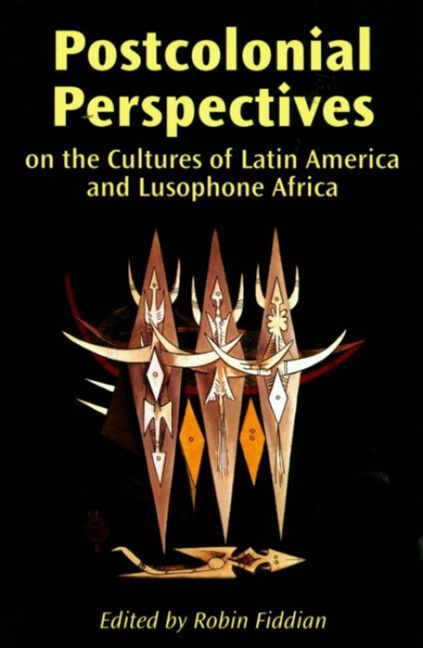Book contents
- Frontmatter
- Contents
- Preface
- Locating the Object, Mapping the Field: the Place of the Cultures of Latin America and Lusophone Africa in Postcolonial Studies
- Chapter One On Metropolitan Readings of Latin American Cultures: Ethical Questions of Postcolonial Critical Practice
- Chapter Two Ig/noble Barbarians: Revisiting Latin American Modernisms
- Chapter Three José Carlos Mariátegui: Culture and the Nation
- Chapter Four Doing Time in Peru: the Poetics of Multitemporality as Method for Cultural History
- Chapter Five America, Americanism and the Third World in the Work of Leopoldo Zea
- Chapter Six Fernando Ortiz's Transculturation: the Postcolonial Intellectual and the Politics of Cultural Representation
- Chapter Seven Caribbean Masks: Frantz Fanon and Alejo Carpentier
- Chapter Eight Colonial Crosswords: (In)voicing the Gap in Mia Couto
- Index
Chapter Five - America, Americanism and the Third World in the Work of Leopoldo Zea
- Frontmatter
- Contents
- Preface
- Locating the Object, Mapping the Field: the Place of the Cultures of Latin America and Lusophone Africa in Postcolonial Studies
- Chapter One On Metropolitan Readings of Latin American Cultures: Ethical Questions of Postcolonial Critical Practice
- Chapter Two Ig/noble Barbarians: Revisiting Latin American Modernisms
- Chapter Three José Carlos Mariátegui: Culture and the Nation
- Chapter Four Doing Time in Peru: the Poetics of Multitemporality as Method for Cultural History
- Chapter Five America, Americanism and the Third World in the Work of Leopoldo Zea
- Chapter Six Fernando Ortiz's Transculturation: the Postcolonial Intellectual and the Politics of Cultural Representation
- Chapter Seven Caribbean Masks: Frantz Fanon and Alejo Carpentier
- Chapter Eight Colonial Crosswords: (In)voicing the Gap in Mia Couto
- Index
Summary
The work of the veteran Mexican intellectual, Leopoldo Zea, offers a wide range of connections with postcolonial theory, a fact acknowledged by Walter Mignolo in two landmark essays of the mid-1990s. ‘Occidentalización, imperialismo, globalización, herencias coloniales y teorías postcoloniales’ (1995) and ‘La razón postcolonial: herencias coloniales y teorías postcoloniales’ (1997) locate Zea decisively within a two-dimensional framework of inquiry into the legacies of colonialism. On one level, Zea is related to contemporary trends in Latin American philosophy, represented— in Mignolo's account—by Enrique Dussel and Rodolfo Kusch who jointly interrogate modern Western rationality from a valorized location on the periphery (‘Occidentalización’, 28); on the other, he is referred (more obliquely) to the broader context of postcolonial studies represented by such figures as Homi Bhabha, Frantz Fanon, Edouard Glissant and Ella Shohat. Following on from Mignolo, the purpose of the present essay is to look more closely at Zea's connections with postcolonial discourse, through a consideration of certain historical and biographical factors which prompted Zea to identify with global processes of decolonization and to subscribe to a particular interpretation of Latin American history. Examination of a range of works written by Zea between the early 1940s and the mid-1990s will broaden considerably the temporal scope found in the essays by Mignolo and elsewhere, and allow a more sustained analysis of Zea's engagement with a number of issues that are central to the historical and discursive phenomenon of postcolonialism.
Born in Mexico City in 1912, and still an active member of the academy at the century's end, Leopoldo Zea is a unique survivor of a generation which lived through the turmoil and the aftermath of the Mexican Revolution and then bore witness, over the decades that followed, to ensuing events in Mexico, the Americas, and the world at large. A volume entitled Filosofar a la altura del hombre published in 1993 includes a biographical summary that is vividly evocative, in spite of the rather conventional picture that it constructs of the author's life and times:
Se trata de un largo camino biográfico dentro del mundo que me había tocado en suerte, mi mundo.
- Type
- Chapter
- Information
- Publisher: Liverpool University PressPrint publication year: 2000



